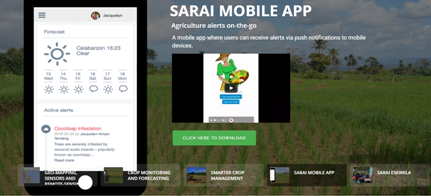Smart agricultural information systems and technologies will aid farmers, agricultural technicians, researchers, and policy makers in dealing with climate uncertainties.
These will be made available to selected government agencies in the Philippines through the project, Deployment and Validation of Smarter Approaches to Reinvigorate Agriculture as an Industry (SARAI) in the Philippines, which was recently approved by the Philippine Council for Agriculture, Aquatic and Natural Resources Research and Development of the Department of Science and Technology (DOST-PCAARRD).
 The information systems and technologies consist of the SARAI-Enhanced Agricultural Monitoring System (SEAMS); Cost-efficient soil moisture monitoring system for soil water deficit and Water Balance-Assisted Irrigation Support System (WAISS); SARAI Knowledge Portal and other mobile and web-based applications (Maize Nutrient Expert System; Smarter Pest Identification Technology (SPId Tech); SARAI SMS Advisories, Pestbook, real-time weather monitoring, crop monitoring and forecasting, SARAI resources, and others).
The information systems and technologies consist of the SARAI-Enhanced Agricultural Monitoring System (SEAMS); Cost-efficient soil moisture monitoring system for soil water deficit and Water Balance-Assisted Irrigation Support System (WAISS); SARAI Knowledge Portal and other mobile and web-based applications (Maize Nutrient Expert System; Smarter Pest Identification Technology (SPId Tech); SARAI SMS Advisories, Pestbook, real-time weather monitoring, crop monitoring and forecasting, SARAI resources, and others).
SEAMS monitors in near-real time the condition of the area planted to a crop through free and daily updated satellite images from US and Europe. Reports from UPLB indicate other uses of SEAMS—in land use changes, vulnerability assessment, identification of possible breeding grounds of major insect pests, and weather condition in areas without weather stations.
WAISS, together with the cost-efficient soil moisture monitoring systems, estimates soil moisture deficit in annual crops such as rice and corn and provides early warning for crop water stress. The soil moisture sensors were developed by UPLB. Through this system, the farmers can decide when not to irrigate their farms.
SPId Tech is a mobile application that can identify agricultural pests in the farm using image scanning. Farmers and technicians can upload images of real time pest infestation. The app identifies the pest, and recommends immediate pest management control.
Maize Nutrient Experts System gives comprehensive farm fertility status. It provides information on specific nitrogen, phosphorus, and potassium (NPK) fertilizer application. It gives information on comparison of profits between the farmers’ practice and the recommended practice, site-specific fertilization level in any corn farm in the country, and other vital information.
These information systems and technologies are outputs of the previously DOST-PCAARRD-funded program on SARAI, which was implemented by the University of the Philippines Los Banos (UPLB). PCAARRD developed the program concept of SARAI.
Under the newly-approved project, such information systems and technologies will be deployed and tested in selected offices, which are members of PCAARRD’s regional consortia, state universities and colleges, DOST regional offices, and local government units. Dr. Decibel F. Eslava of UPLB-School of Environmental Science and Management will lead the project team.
The team will assess the agencies’ readiness, capability, and resources for adopting and managing the systems. Orientations and trainings on how to use the systems will be conducted. Users’ feedbacks and acceptability will be measured through surveys and interviews. Analysis of feedbacks will help the project experts further improve the systems, thus making them even more technically accurate, relevant, and user-friendly.
